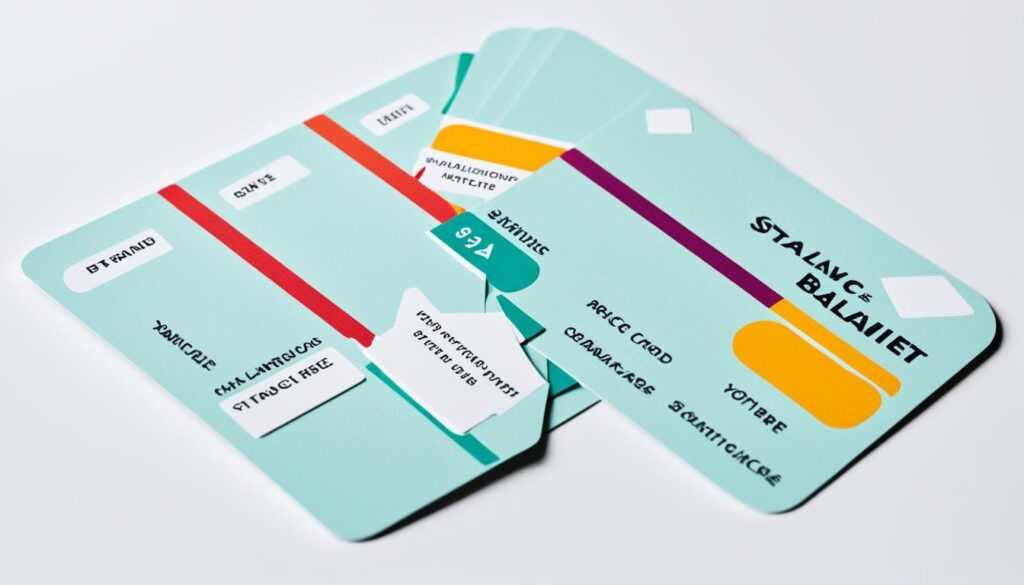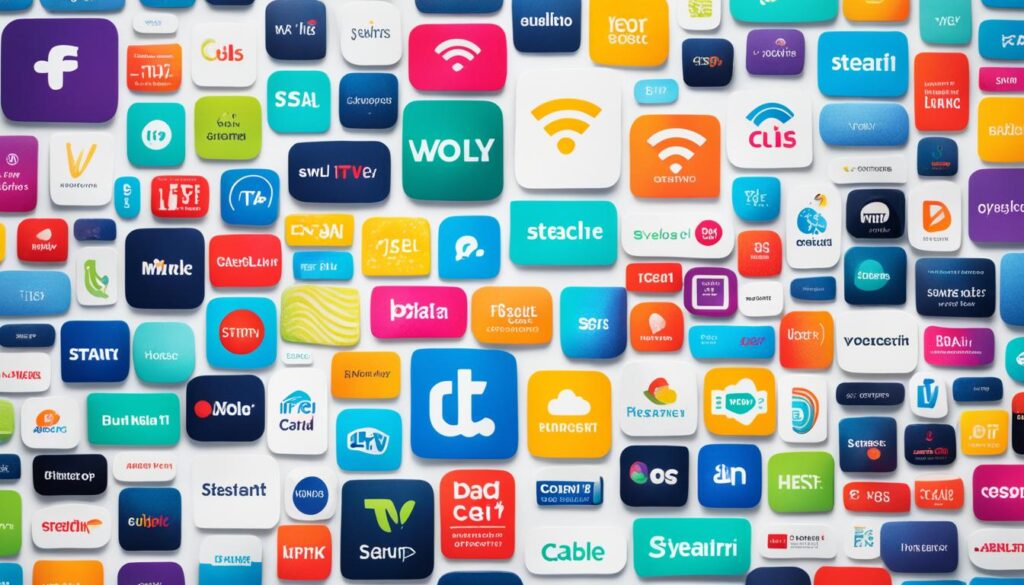Trying to lower your monthly bills is smart. It means more money stays with you. Whether that’s cutting down on utility bills or getting better rates on phone and cable services, negotiating can help. We’re here to give you 10 useful tips. They will guide you to negotiate like a pro and save money along the way.

Key Takeaways:
- Take the initiative and reach out to your service providers to negotiate better deals.
- Consider switching to a fixed pricing plan or a time-of-use plan to reduce bills costs.
- Evaluate your services and downgrade to lower-cost options if they’re not essential.
- Upgrade to energy-efficient appliances and use them wisely to save on utility bills.
- Rotate discretionary bills like streaming services to keep costs low.
Negotiate Your Bills
Reducing your monthly expenses can be hugely impacted by negotiating your bills. Contacting providers like cable or internet companies could lead to better deals. Wondering how to negotiate effectively?
Here are some tips to guide you in bill negotiation:
- Be prepared: Research standard prices before you call. Knowing these can help you target better deals.
- Call with confidence: Show confidence when you speak. Say clearly what you want and keep pushing for a good deal.
- Highlight your loyalty: If you’ve been with them a while or always paid on time, say so. It strengthens your case.
- Be polite and pleasant: Kindness goes a long way. A nice tone can help in negotiations.
- Explain your situation: If money’s tight or there’s a reason you need lower bills, tell them. They might work with you to find a solution.
- Consider bundling: Look into combining services with one company. Bundles often come with discounts.
- Explore third-party negotiation services: If you’re not into negotiating, services like Experian BillFixer™ can do it for you.
Remember, negotiation isn’t one approach fits all. Every situation is different, and various factors affect your success. If one attempt fails, try other ways. Keep trying.
Table: Bill Negotiation Comparison
| Service Provider | Standard Price | Negotiated Price |
|---|---|---|
| ABC Cable | $100/month | $75/month |
| XYZ Internet | $60/month | $45/month |
| 123 Phone Company | $50/month | $35/month |
Negotiating can save you a lot on monthly bills, as the table shows. Don’t hesitate to start negotiations for better rates. With effort and persistence, you can cut costs and save more.
“Negotiating bills is key to cutting monthly expenses. With simple tips and persistence, you can get great deals and avoid overpaying for key services.” – Financial expert, Jane Smith
Switch to a Fixed Pricing Plan
Want to cut down on your bill costs? Think about moving to a fixed pricing plan or a time-of-use plan. Your service providers offer these. They can help lower expenses like electricity by having cheaper rates at certain times.
With a fixed pricing plan, your monthly bill is the same, no matter how much you use. This means no surprises with bill changes. It’s easier to manage your money with fixed costs.
A time-of-use plan lets you save by using services when it’s cheaper. Doing laundry or using appliances at night can lower your bill. This is great for families who can adjust when they use energy.
Before picking a plan, look at what different providers offer. Think about the cost during different times and any extra fees. Researching well ensures you choose the best for your budget and how you use energy.
Choosing a fixed or time-of-use plan can help save on bills. Explore more in the next sections for tips on reducing bill costs. Advice on negotiating bills, reducing services, and using energy-efficient appliances awaits.

Downgrade Service
Looking to cut your bills? Think about downgrading your current services. Often, we pay for things we don’t use much. This can lead to unnecessary costs. By choosing cheaper options, you can save money each month without losing much.
Start by checking your service subscriptions. This includes your internet and TV packages. Consider if you need all the features you’re paying for. Maybe a simpler plan would work for you. For example, if you just surf the web and email, a slower internet might be enough.
Also, look at your TV package. Do you watch all those extra channels? Maybe you just stick to a few favorites or mainly use streaming services. If so, a smaller package could save you a lot of money.
Controlling your utility bills is about using what you need. By picking the right service size, you can manage your budget better. This way, you can use the saved money for other goals.

Downgrading can also help you get better deals on your bills. Tell your providers you’re thinking of cutting back. They might offer you a discount. This is often true for cable, internet, and phone services. They usually have different deals to fit what you can afford.
By choosing only necessary services, you can lower your bills. This makes room in your budget for other key expenses. Make sure to think about what you truly need before making any changes. You want to be happy with what you get.
Downgrading doesn’t mean losing quality. It’s about making smart choices that match your lifestyle and budget. By picking the right services and talking to your providers, you can keep costs down. This way, you don’t have to give up having a good experience.
Use Efficient Appliances
Lowering your bill costs can be as simple as getting more efficient appliances and light bulbs. These not only make the planet greener but also cut down on your electricity and gas bills.
Want to use less energy and spend less money each month? Think about swapping old appliances for new, energy-efficient models. Look for the ENERGY STAR® label. It shows they meet tough energy efficiency rules by the U.S. Environmental Protection Agency (EPA) and the U.S. Department of Energy (DOE).
Energy-efficient appliances use less electricity or gas but work just as well. By choosing these, you can reduce how much energy you use and lower your bills.
Making small changes in your daily routine can also help. For instance, try air-drying clothes instead of using a dryer to save electricity. Switch out old light bulbs for LED bulbs too. They use much less energy and last longer.
Efficient appliances and light bulbs can significantly lower your bills. Over time, the money you save adds up. This means you can spend on other key things or save for the future.

Benefits of Using Efficient Appliances:
- Lower energy consumption
- Reduced utility bills
- Longer lifespan
- Environmentally friendly
| Appliance | Average Annual Energy Cost | Energy Efficiency Rating |
|---|---|---|
| Refrigerator | $70 | ENERGY STAR® |
| Washing Machine | $25 | ENERGY STAR® |
| Dishwasher | $35 | ENERGY STAR® |
| Air Conditioner | $175 | ENERGY STAR® |
Rotate Services
Want to lower your bill costs? Try rotating your discretionary services. By pausing or stopping services you don’t use often and switching between them, you can keep enjoying entertainment without spending too much.
Let’s talk about streaming services. Many people have several subscriptions, which can be expensive. You can rotate your subscriptions based on what you want to watch. For example, pick a streaming service, subscribe for a while, and then stop it after you’ve watched everything you wanted. This keeps you entertained without wasting money on unused services.
Rotating services isn’t just for streaming. It works for meal kits, music apps, or fitness apps too. With this strategy, you get to enjoy various services and save money on your monthly bills.
“Rotating services allows you to maintain variety and enjoy the perks of different subscriptions while being mindful of your budget,” says Jane Doe, a personal finance expert.
Make a schedule to manage your service rotation. This helps you remember when to start or stop a service. Also, review your subscriptions now and then. Cut out the ones you don’t really use or need. This way, you only spend on services that add value to your life, helping you save money and cut down on waste.
Benefits of Service Rotation
Rotating services doesn’t just cut costs. It also lets you:
- Keep entertainment within your budget
- Try different platforms without long-term commitments
- Discover new stuff with every rotation
- Control your expenses by managing your subscriptions well
By rotating services, you balance enjoying great services with keeping your bills low.

| Service | Monthly Cost |
|---|---|
| Streaming Service A | $12.99 |
| Streaming Service B | $8.99 |
| Music Streaming Service | $9.99 |
| Meal Kit Subscription | $10.00 |
| Total | $41.97 |
“By rotating your services, you can potentially save hundreds of dollars each year. It’s a practical and effective way to cut down on bills costs without sacrificing entertainment or convenience,” advises John Smith, a financial advisor.
Refinance Loans
Refinancing loans, like car loans or mortgages, can help lower your monthly costs. It lets you get a lower interest rate, saving you money. Before deciding, look at your choices carefully and compare interest rates and credit scores.
If your credit has gotten better since getting a car loan, refinancing could reduce your payments. A better credit score means lower interest rates. Always check your credit score first to make sure it’s high.
Reducing bills costs is important for many people. Refinancing loans can help with that. Do your homework and understand the terms and conditions. Talking to a financial advisor is also a smart move for advice.
“Refinancing loans cuts down monthly costs and can save you thousands of dollars. By checking out different choices and learning their pros and cons, you can choose wisely for your finances,” says a Financial Advisor.
Benefits of Refinancing Loans
- Lower monthly payments
- Potential savings on interest charges
- Chance to combine debts
- Better cash flow
Considerations Before Refinancing
Think about these before refinancing:
- Your current and possible new interest rate and payments
- Costs related to refinancing
- How your credit score affects your options
- How long you’ll stay in your current home (for mortgages)
Example: Car Loan Refinancing Offers
| Lender | Interest Rate | Loan Term |
|---|---|---|
| Bank A | 3.5% | 48 months |
| Bank B | 4.2% | 48 months |
| Bank C | 2.9% | 36 months |
As shown above, comparing different lenders’ rates and terms is a must. This helps you find the best deal to lower your monthly costs.
Smart refinancing can improve your finances. By getting lower rates and maybe combining debt, you can pay less each month and be in better shape financially.

Use a Balance Transfer Card
If you have credit card debt, consider transferring your balance to a card with a lower or 0% introductory APR. This move can help cut down on your interest. It also lowers your monthly bills.
By moving your debt to one card, you make payment simpler. You might also save some cash.
Switching your debt to a balance transfer card gives you some space. You can pay down your debt without piling up more interest. Pick a card with a long introductory period and low transfer fees to get the most benefit.
Before you switch, check your credit score. Banks give the best rates to those with great scores, so it’s key to know yours. Also, aim to clear the balance each month. This avoids any new interest charges.
Using a balance transfer card wisely can cut your bill costs. It’s a clever way to get out of debt quicker. Grab this chance and start managing your money better now.

| Pros | Cons |
|---|---|
| Lower or 0% introductory APR | May incur transfer fees |
| Simplify payments with consolidated debt | Requires a good credit score |
| Chance to save on interest | Must pay off balance each month |
| Could reduce monthly bills |
Bundle Products
Bundling products is a smart way to lower your bills. Many companies offer discounts if you combine services like insurance or internet and cable. This not only saves you money but also simplifies your payments.
To find the best deals, research providers in your area. Look at prices, features, and what other customers say. Remember, the best bundle for you depends on your location and what you need.

Advantages of Bundle Products
- Bundles often come with discounted rates, helping you save money compared to purchasing services individually.
- Convenience – you can manage multiple services through a single provider, simplifying billing and customer support.
- Streamlined services – bundling allows for seamless integration between different products, enhancing your overall experience.
- Special perks – some providers offer additional perks, such as free installation or premium channel upgrades, as part of their bundle packages.
Thinking of bundling? Consider what you really need and the long-term benefits. Make sure to check the terms and any fees to see if it’s right for you.
Example of Bundle Products
Here’s how bundling can cut your bills:
| Services | Individual Cost | Bundle Cost | Savings |
|---|---|---|---|
| Internet | $50/month | $40/month | $10/month |
| Cable TV | $60/month | $50/month | $10/month |
| Home Phone | $30/month | $25/month | $5/month |
In this case, the bundle saves $25 monthly over individual prices. Over a year, this adds up to substantial savings.
Bundle your products. This way, you save money every month and deal with just one provider.
Get a Family Plan
If you want to cut down your cellphone bill, think about getting a family plan. This plan lets you share with family or close ones. They don’t even need to live with you.
By bringing your cellphone services together into one family plan, you save money. Providers give cheaper rates and shared data for these plans. This helps lower your monthly costs.
A family plan isn’t just about saving money. It also makes things simpler and more flexible. You can manage many lines and check usage all in one place. This keeps your bills organized and makes sure everyone gets what they need.
Looking to cut costs on phone lines or keep your whole home connected? A family plan is your answer. It cuts your bills while you enjoy reliable service.

Benefits of a Family Plan
- Shared data: With a family plan, you can pool your data allowances and avoid overage charges.
- Cost savings: Family plans often come with discounted rates and additional lines at reduced prices, helping you save money in the long run.
- Flexible options: You can choose different data plans and features based on each family member’s needs, ensuring that everyone has access to the services they require.
- Convenient management: With a family plan, you can manage all the lines and payments in one place, simplifying your bill management process.
- Easy communication: Family plans often include unlimited talk and text, making it easy for family members to stay connected without worrying about additional charges.
Switching to a family plan is smart for reducing your bill. It keeps everyone connected while saving money. Consider the savings and convenience of a family plan and start lowering your cellphone expenses today.
Shop Around
Looking to save on bills like insurance or utilities? It’s smart to shop around. This means checking out different providers to see who has the best prices. You can find the perfect fit for your budget this way.
Want to compare quotes fast? There are tools for that. Sites that compare quotes let you put in your info once. Then, they give you prices from many providers. This saves you from having to call each company yourself.
But don’t just look at the price. The coverage or services are important too. Sometimes, the cheapest option isn’t the best. Think about what you’re getting for your money before you decide.
Customer reviews are really helpful. They let you see what others think of a provider. Good customer service matters just as much as a good price. You want to feel taken care of.
By looking at all your options, you can save money and still get great service. It’s all about finding the right mix of price and quality.

Benefits of Shopping Around:
- Save money: By comparing prices, you can find providers that offer lower rates or discounts, helping you reduce your monthly bills.
- Get better coverage: Shopping around allows you to find providers that offer more comprehensive coverage or services, ensuring you get the best value for your money.
- Find quality service: Reading customer reviews and ratings can help you choose providers that offer excellent customer service and support, ensuring a positive experience.
Make Your Bills Work for Your Credit Score
Keeping track of your bills helps with your finances and boosts your credit score. Using Experian Boost lets you include your timely bill payments in your credit report. This can positively affect your credit score.
When you add your payment history for bills like rent and utilities to your credit report through Experian Boost, it shows good financial habits. This could lead to a higher credit score. It may also help you get better interest rates and loan terms later on.
Making bill payments on time is good for your credit score and can lower monthly costs. By getting better deals and organizing your bills well, you can save money. Use this saved money for savings, investments, or to reach your financial goals.
Platforms like Experian Boost can save you money and improve your credit score by using your bill payment history. Make your bills improve your financial health. It sets you up for a successful financial future.